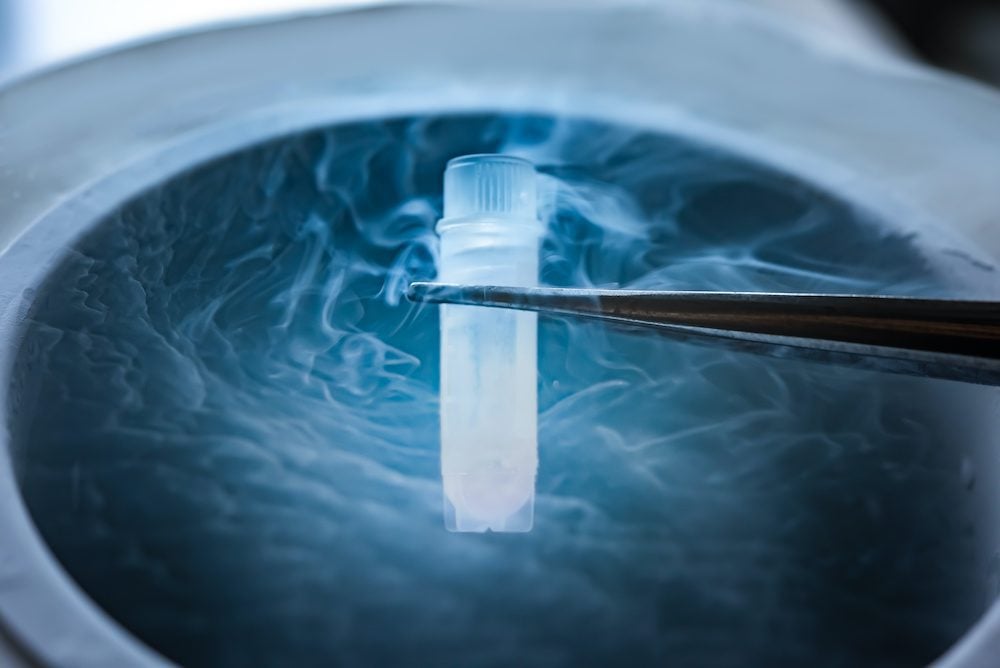More and more women and couples are having children later in life. Understandably so, many might feel as though they want to focus on their careers or other endeavors in their life before expanding their family. But when is it too late? Does freezing your eggs at 40 make sense?
In this article, we’re going to explore freezing eggs at 40. What should you know? Why do people freeze their eggs? Is 40 too late to freeze your eggs? Let’s take a closer look.
Why Do People Freeze Their Eggs?
The egg freezing process is frequently explored when an individual or couple isn’t ready to have children but want the option to do so in the future. Perhaps other priorities are consuming a large majority of their time, such as a career, health issue, traveling, or other endeavors. It can also be a personal choice, depending on your specific life circumstances. For example, those who are about to undergo intensive cancer treatment, like chemotherapy or radiation, may choose to freeze their eggs beforehand since this type of therapy can impact one’s fertility.
Since fertility declines throughout a woman’s 30s and 40s, freezing your eggs can offer you an opportunity to have a child later on down the road.
What Is The Best Age To Freeze Your Eggs?
The unfortunate truth is that fertility begins to decline at the age of 30, becoming an even steeper decline after the age of 35. This usually means that before age 35 is considered the best age to freeze your eggs. By undergoing the egg retrieval and egg freezing process before 35 or 36 years of age, you’re more likely to retrieve more eggs and higher quality eggs. This means that when the time comes, you’re more likely to get pregnant.
Can I Freeze My Eggs At 40 or Older?
Surprisingly, freezing your eggs at 40 is entirely possible. Fertility does vary from person to person, and some individuals have had success with freezing their eggs at 40 and starting a family later on.
However, it’s important to note that research shows that those who freeze their eggs before 36 are more likely to have success. This research also indicates that there is a very low success rate for women who freeze their eggs at or after 40.
What Is The Egg Freezing Process?
The egg freezing process is fairly straightforward. Usually, it begins with fertility testing, such as checking your ovarian reserve (the quality and quantity of your eggs) and performing an infectious disease screening. There are three main steps in the egg freezing process, ovarian stimulation, egg retrieval, and freezing.
- Ovarian Stimulation: This stage involves the use of synthetic hormones to stimulate the ovaries. This causes the ovaries to produce multiple eggs, allowing your fertility team to get the most quality eggs possible. Depending on your fertility team and circumstance, the hormones used may include follitropin alfa or beta, menotropins, leuprolide acetate, or a gonadotropin-releasing hormone antagonist. Throughout this process, your doctor will monitor you with blood tests to ensure you respond well to the synthetic hormones. A vaginal ultrasound may also be performed to monitor the development of the egg follicles.
- Egg Retrieval: After about 10-14 days, your doctor gives you a human chorionic gonadotropin injection to further the egg’s maturity. Once the eggs are mature, the egg retrieval process is done. Typically, you are sedated for this stage. Your doctor will then use an ultrasound probe to find the follicles. Once identified, a suction device is used to retrieve the eggs.
- Freezing: Once the eggs are harvested, they are cooled to appropriate temperatures for preservation. The most common process used in this stage is called vitrification.
Post-egg retrieval, you may experience some cramping and pressure or “fullness” due to the enlargement of your ovaries. This may last for a few weeks but is usually nothing to worry about.
Egg Quality At 40
Unfortunately, after 40, egg quality drastically declines. Typically, this means that less than half of your eggs are considered viable for egg retrieval or pregnancy. The reason for this is often due to a declining ovarian environment, which leads to fewer mature eggs. This is also why it can be trickier to get pregnant naturally after 40.
Frozen Egg Success Rate At 40 or Over
The previously mentioned study in this article had no live births resulting from egg freezing at 40 or over. However, this was a small study, consisting of a cohort at only one fertility clinic. There is still some hope, and some individuals have had success going this route. It really depends on the person and their individual fertility.
How Long Can You Store Eggs
Most fertility clinics agree that frozen eggs can safely be stored for 10 years or more. There have even been successful pregnancies after freezing eggs for up to 14 years.
What Are The Side Effects Of Egg Freezing?
Side effects of egg freezing usually result from the hormones that increase the number of mature eggs. These side effects may involve moodiness, hot flashes, headaches, insomnia, breast tenderness, or bloating.
Some women may also experience some feelings of pressure, cramping, or fullness after the egg retrieval procedure due to enlarged ovaries. This usually subsides within a week or two.
If you experience a high fever, severe abdominal pain, excessive weight gain, heavy vaginal bleeding, or trouble urinating at any point during the process or afterward, contact your doctor immediately.
When Is It Too Late To Freeze Your Eggs?
It’s never too late! However, this does depend on the individual. As previously mentioned, fertility declines rapidly after a woman’s mid-30s. Some fertility clinics also won’t perform egg retrieval or egg freezing after particular ages, such as 42. At the same time, most clinics and fertility teams will try to work with you to make your baby dreams come true!
At ELITE IVF, we are here to support you every step of the way. Contact us today to find out more about our egg freezing process and how we can help you.


